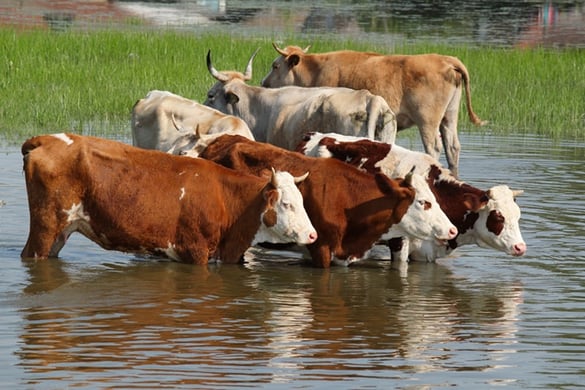 No matter where you are within the agricultural supply chain, it’s critically important to understand the different variables that go into growing crops safely. When it comes to the safety of your irrigation water, here’s a question you should ask yourself daily: Are you adequately treating the water you are pulling from ponds and wells to irrigate your crops to help prevent the spread of waterborne pathogens?
No matter where you are within the agricultural supply chain, it’s critically important to understand the different variables that go into growing crops safely. When it comes to the safety of your irrigation water, here’s a question you should ask yourself daily: Are you adequately treating the water you are pulling from ponds and wells to irrigate your crops to help prevent the spread of waterborne pathogens?
Without consistent and conscientious water treatment practices, potentially dangerous pathogens and contaminants threaten agricultural source water. According to the CDC website, 3,000 people die every year from foodborne diseases—and about 1 in 6 Americans gets sick from food each year. However, new government mandated agricultural standards are currently phasing into effect with the full implementation of the Food Safety Modernization Act (FSMA). All agricultural operations must prepare to meet the new standards.
Once it’s in full effect, the government will require all agricultural source water to be “safe and sanitary for its intended use” to assist in reducing instances of foodborne illness. Will your irrigation water stand up to the test?
Agricultural Source Water: A New Definition
One of the major changes in the FSMA is the redefinition of what “agricultural water” is. Today, the definition has been expanded to include water that is intended to, or is likely to, contact covered produce (which includes most raw fruits and vegetables).
This includes water that is used:
- In growing produce, including irrigation water directly applied to growing produce.
- For preparing crop sprays.
- For growing sprouts.
- For harvesting, packing, and holding.
- For washing or cooling harvested produce.
- To prevent dehydration.
DIY FSMA
There’s a lot you can do to meet the requirements of the FSMA without finding a new water source or making extensive investments in treatment chemicals or equipment. When it comes to agricultural water, the FSMA standards require you to inspect, maintain, monitor and follow up on any issues uncovered in your water sources.
Prepare for full implementation of the FSMA by:
- Getting your agricultural source water tested for potentially dangerous pathogens by a lab prior to the growing season. This will give you a better idea of where you need to make changes to help ensure a safe water source.
- Maintaining your existing irrigation system. Depending on your water source, you may need to ensure that you’re regularly treating water to help destroy pathogens, inhibit bacterial growth, control algae and iron buildup and keep your drip lines clearer.
- Monitor your water source and system throughout the growing season. Regular water quality checks help advance the use of clean and safe water for growing, harvesting, packing and holding.
- Implementing a field-proven water treatment strategy like the Accu-Tab chlorination system can help you simplify your water treatment process to meet testing requirements for FSMA. There is no requirement to test agricultural water that is received from public water systems or if the water is treated in compliance with the rule’s treatment requirements.
Growers preparing for a new era of irrigation regulation should take steps so that their water can stand up to these new standards. Fortunately, there’s a lot that growers can do themselves to prepare for the FSMA.

